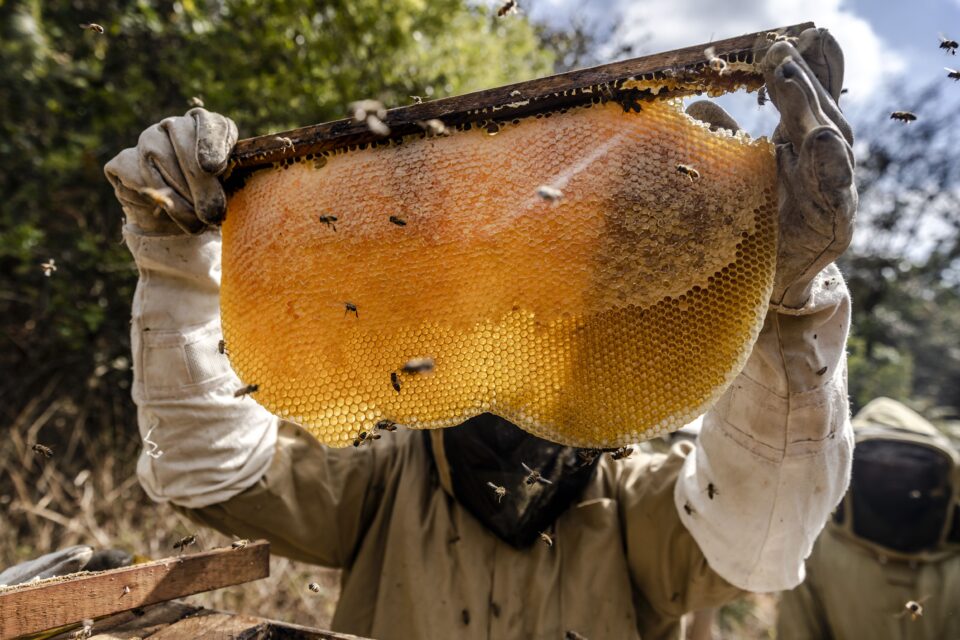Ethiopia hosts global celebration, spotlighting pollinators’ role in food security and sustainability
20 May 2025, Jimma, Ethiopia – The Food and Agriculture Organization of the United Nations (FAO) marked World Bee Day 2025 with a global celebration in Jimma, Ethiopia, one of the world’s top honey-producing countries. The event, held for the first time on African soil, highlighted the importance of bees and other pollinators in maintaining global food systems and supporting livelihoods—especially across the African continent.
Speaking via video message, FAO Director-General Qu Dongyu paid tribute to bees, butterflies, birds, bats, and other pollinators, calling them “silent heroes” and emphasizing the urgent need for global cooperation to protect them.
“On this World Bee Day, we celebrated the enormous contribution of bees to food, health, the environment, and our economies,” Qu said. “Pollinators hold immense economic value. Without them, we risk losing up to 8% of global crop production annually—equivalent to around USD 577 billion.”
The theme of this year’s celebration, “Bee inspired by nature to nourish us all,” underscored the ecological and economic roles of more than 20,000 bee species and other pollinators. FAO noted that nearly 90% of flowering plants and 75% of food crops rely on pollinators, from fruits and vegetables to nuts and oilseeds.
Africa’s Honey Boom
New figures released by FAO during the event revealed that Africa recorded the highest growth rate in global honey production. In 2023, global honey output reached 1.894 million tonnes, with Africa contributing 223,000 tonnes—about 12% of total global production.
Ethiopia retained its position as Africa’s top honey producer and ranked tenth globally. Other key producers on the continent included Algeria, Angola, Cameroon, the Central African Republic, Egypt, Kenya, Morocco, Rwanda, and Tanzania.
Hosting the global event in Jimma signified Ethiopia’s growing influence in the beekeeping sector.
“This celebration was an important platform for Ethiopia to assess challenges and develop solutions for our agricultural sector,” said H.E. Girma Amente, Ethiopia’s Minister of Agriculture. “We called upon all stakeholders to safeguard pollinators and promote sustainable beekeeping as a pathway to sustainable development.”
Abebe Haile-Gabriel, FAO Assistant Director-General and Regional Representative for Africa, emphasized the potential of African honey production in tapping into organic and fair-trade niche markets.
“African honeybees have demonstrated strong resilience against parasites and pathogens,” he noted. “Traditional beekeeping provides a valuable foundation for sustainable and locally-adapted practices.”
Celebrating Bees, Inspiring Action
World Bee Day was established by a UN resolution in 2017, following a proposal by the Government of Slovenia. Marking the 2025 edition, Slovenia’s Minister of Agriculture Mateja Calusic said in a video message that hosting the event in Africa paid tribute to the continent’s long-standing beekeeping traditions.
“In a time of war, climate change, and food crises, bees remind us of the power of silent, collective action,” she said. “They are small, yet their impact is profound.”
The day’s activities included a photo exhibition and the screening of an animated film for youth titled Asali: The Power of the Pollinators.
Forum for Sustainable Beekeeping and Pollination
The celebration also marked the opening of the Second International Forum for Action on Sustainable Beekeeping and Pollination, co-organized by Ethiopia, Slovenia, FAO, UNIDO, and Apimondia.
The two-day forum brought together global experts, government officials, and beekeepers to exchange knowledge and forge partnerships for pollinator protection. Two high-level panel discussions focused on:
- The role of beekeeping in food security and livelihoods, with a keynote by Apimondia President Jeff Pettis;
- International cooperation for pollinator protection, featuring a keynote from Braulio Ferreira de Souza Dias, Director at Brazil’s Ministry of Environment and Climate Change.
Sessions included testimonials from young Ethiopian beekeepers and farmers, and concluded with a field visit showcasing sustainable beekeeping methods in practice.
In the context of FAO’s 80th anniversary, Director-General Qu expressed gratitude to the Governments of Ethiopia and Slovenia, and all FAO partners, for advancing the protection of pollinators and promoting sustainable agriculture.
“This forum was a platform to build partnerships, share knowledge, and commit to a future where pollinators are protected and agriculture is sustainable,” he said. “Together, we work for better production, better nutrition, a better environment, and a better life—for all.”


